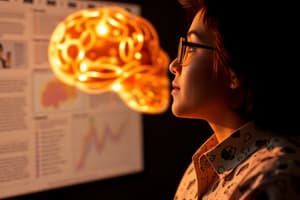Podcast
Questions and Answers
Which stage of Piaget's Cognitive Development involves developing symbolic thinking and egocentrism?
Which stage of Piaget's Cognitive Development involves developing symbolic thinking and egocentrism?
- Concrete Operational Stage
- Sensorimotor Stage
- Preoperational Stage (correct)
- Formal Operational Stage
Social Learning Theory suggests that individuals learn primarily through personal experience rather than observation.
Social Learning Theory suggests that individuals learn primarily through personal experience rather than observation.
False (B)
Name the sixth stage of human development according to key stages of development.
Name the sixth stage of human development according to key stages of development.
Old Age
In the _____ stage of cognitive development, children begin to think logically about concrete events.
In the _____ stage of cognitive development, children begin to think logically about concrete events.
Match the following psychologists to their theories or contributions:
Match the following psychologists to their theories or contributions:
Which field of psychology focuses on the treatment of mental disorders?
Which field of psychology focuses on the treatment of mental disorders?
Behaviorism does not consider internal mental processes.
Behaviorism does not consider internal mental processes.
Name one key figure in humanistic psychology.
Name one key figure in humanistic psychology.
The process of learning through reinforcement and punishment is known as __________.
The process of learning through reinforcement and punishment is known as __________.
Match the following psychological disorders with their categories:
Match the following psychological disorders with their categories:
Which research method involves manipulating variables to determine cause and effect?
Which research method involves manipulating variables to determine cause and effect?
Cognitive psychology focuses on observable actions.
Cognitive psychology focuses on observable actions.
What is classical conditioning?
What is classical conditioning?
Study Notes
Introduction to Psychology
- Definition: The scientific study of mind and behavior.
- Fields of Study:
- Clinical Psychology
- Cognitive Psychology
- Developmental Psychology
- Social Psychology
- Neuropsychology
Key Concepts
-
Behavior:
- Observable actions of a person or animal.
-
Mental Processes:
- Internal processes (thoughts, emotions, perceptions).
-
Theories of Psychology:
- Behaviorism: Focuses on observable behavior; key figures include B.F. Skinner and John B. Watson.
- Cognitive Psychology: Studies mental processes like perception, memory, and problem-solving; key figures include Jean Piaget and Aaron Beck.
- Humanistic Psychology: Emphasizes personal growth and self-actualization; key figures include Carl Rogers and Abraham Maslow.
- Psychoanalytic Theory: Focuses on unconscious processes and childhood experiences; founded by Sigmund Freud.
Research Methods
- Experimental: Involves manipulation of variables to determine cause and effect.
- Observational: Systematic observation of behavior in natural settings.
- Surveys: Use questionnaires/interviews to collect data about thoughts, feelings, and behaviors.
- Case Studies: In-depth examination of a single individual or group.
Areas of Application
- Clinical Psychology: Assessment and treatment of mental disorders.
- Counseling Psychology: Focus on personal and interpersonal functioning across lifespan.
- Industrial-Organizational Psychology: Application of psychological principles in workplace settings.
- Educational Psychology: Study of how people learn and the best practices to teach.
Major Psychological Disorders
- Anxiety Disorders: Generalized anxiety disorder, panic disorder, phobias.
- Mood Disorders: Depression, bipolar disorder.
- Personality Disorders: Borderline, narcissistic, antisocial personality disorders.
- Psychotic Disorders: Schizophrenia and delusional disorders.
Important Figures
- Sigmund Freud: Founder of psychoanalysis.
- Carl Jung: Developed analytical psychology; concepts of introversion/extraversion.
- B.F. Skinner: Prominent behaviorist known for operant conditioning.
Psychological Theories of Learning
- Classical Conditioning: Learning through association; Ivan Pavlov's experiments.
- Operant Conditioning: Learning through reinforcement and punishment; Skinner's work.
- Social Learning Theory: Learning through observation and imitation; Albert Bandura's experiments.
Developmental Psychology
- Focuses on human growth and changes throughout life.
- Key Stages of Development:
- Prenatal
- Infancy
- Childhood
- Adolescence
- Adulthood
- Old Age
Cognitive Development (Piaget's Stages)
- Sensorimotor Stage (0-2 years): Developing sensory and motor skills.
- Preoperational Stage (2-7 years): Symbolic thinking and egocentrism.
- Concrete Operational Stage (7-11 years): Logical thinking about concrete events.
- Formal Operational Stage (12 years and up): Abstract and logical reasoning.
Social Psychology
- Studies how individuals influence and are influenced by others.
- Key topics include:
- Group dynamics
- Conformity and obedience
- Attitudes and persuasion
- Prejudice and discrimination
Neuroscience and Psychology
- Explores the connection between brain function and behavior.
- Key areas of study:
- Neurotransmitters
- Brain structures and functions
- Effects of drugs on the brain and behavior.
Introduction to Psychology
- Psychology is the scientific study of mind and behavior
- Key areas of study include clinical psychology, cognitive psychology, developmental psychology, social psychology, and neuropsychology
Key Concepts
- Behavior refers to observable actions of people or animals.
- Mental Processes are internal thoughts, emotions, and perceptions.
- Theories of Psychology provide frameworks to understand behavior and mental processes.
- Behaviorism emphasizes observable behavior with key figures like B.F. Skinner and John B. Watson.
- Cognitive Psychology studies mental processes like perception, memory, and problem-solving with key figures like Jean Piaget and Aaron Beck.
- Humanistic Psychology focuses on personal growth and self-actualization with key figures like Carl Rogers and Abraham Maslow.
- Psychoanalytic Theory emphasizes unconscious processes and childhood experiences, founded by Sigmund Freud.
Research Methods
- Experimental methods manipulate variables to determine cause and effect.
- Observational methods systematically observe behavior in natural settings.
- Surveys use questionnaires or interviews to collect data about thoughts, feelings, and behaviors.
- Case Studies involve in-depth examinations of a single individual or group.
Areas of Application
- Clinical Psychology focuses on assessment and treatment of mental disorders.
- Counseling Psychology focuses on personal and interpersonal functioning across the lifespan.
- Industrial-Organizational Psychology applies psychological principles to workplace settings.
- Educational Psychology studies how people learn and best practices for teaching.
Major Psychological Disorders
- Anxiety Disorders include generalized anxiety disorder, panic disorder, and phobias.
- Mood Disorders include depression and bipolar disorder.
- Personality Disorders include borderline, narcissistic, and antisocial personality disorders.
- Psychotic Disorders include schizophrenia and delusional disorders.
Important Figures
- Sigmund Freud founded psychoanalysis.
- Carl Jung developed analytical psychology, known for concepts like introversion and extraversion.
- B.F. Skinner was a prominent behaviorist known for operant conditioning.
Psychological Theories of Learning
- Classical Conditioning involves learning through association, as demonstrated by Ivan Pavlov's experiments.
- Operant Conditioning involves learning through reinforcement and punishment, as demonstrated by Skinner's work.
- Social Learning Theory emphasizes learning through observation and imitation, as demonstrated by Albert Bandura's experiments.
Developmental Psychology
- Developmental Psychology focuses on human growth and changes throughout life.
- Key Stages of Development:
- Prenatal
- Infancy
- Childhood
- Adolescence
- Adulthood
- Old Age
Cognitive Development (Piaget's Stages)
- Sensorimotor Stage (0-2 years): Developing sensory and motor skills.
- Preoperational Stage (2-7 years): Symbolic thinking emerges, with some egocentrism.
- Concrete Operational Stage (7-11 years): Logical thinking about concrete events develops.
- Formal Operational Stage (12 years and up): Abstract and logical reasoning emerge.
Social Psychology
- Social Psychology studies how individuals influence and are influenced by each other.
- Key topics:
- Group dynamics
- Conformity and obedience
- Attitudes and persuasion
- Prejudice and discrimination
Neuroscience and Psychology
- Neuroscience and Psychology explore the connection between brain function and behavior.
- Key areas of study:
- Neurotransmitters
- Brain structures and their associated functions
- The effects of drugs on the brain and behavior.
Studying That Suits You
Use AI to generate personalized quizzes and flashcards to suit your learning preferences.
Description
Explore the foundational concepts of psychology through this quiz. It covers key definitions, fields of study, major theories, and research methods. Test your knowledge on behavior, mental processes, and influential psychologists.





